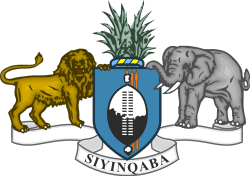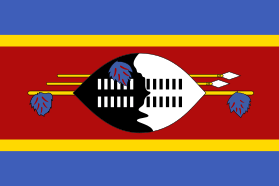House of Assembly of Eswatini
The House of Assembly of Eswatini is the lower chamber of the country's bicameral Parliament.[1] The Assembly may debate and pass bills.[2]
 |
|---|
| This article is part of a series on the politics and government of Eswatini |
|
Monarchy
|
|
Government |
|
|
Administrative divisions |
|
|
|
Related topics |
Constitution
A maximum of 76 members are permitted by section 95 (1) of the Constitution.[2] There are currently 66. Fifty-five members are elected from single-member constituencies corresponding to the tinkhundlas (tribal communities).[2] Fourteen tinkhundlas are in Hhohho District, 11 in Lubombo District, 16 in Manzini District, and 14 in Shiselweni District. The King appoints the other ten members,[2] at least half of whom must be women.[3] The 66th member is the Speaker of the House, who is elected from outside the House.[2] If the percentage of women members falls below 30%, a maximum of four women may be elected from the administrative regions.[1]
Each member must be a citizen of Eswatini, at least 18 years old, a registered voter, and have "paid all taxes or made arrangements satisfactory to the Commissioner of Taxes".[3]
The House selects ten of the 30 members of the upper chamber, the Senate of Eswatini, the King appointing the rest.[4]
Elections
Candidates are first nominated at the tinkhundla level. The top three finishers by secret ballot then proceed to a general election, also by secret ballot, in a first-past-the-post system of voting, where the candidate who receives the most votes is elected.[3][4] All candidates run on a non-partisan basis, as political parties are banned in the country, and serve five-year terms.[1]
Observer teams from the Commonwealth of Nations were present at the 2003, 2008 and 2013 elections.[5] The most recent election took place in September 2018.[5]
See also
- History of Eswatini
- List of national legislatures
- List of Speakers of the House of Assembly of Eswatini
- Legislative branch
References
- "The Parliament of Swaziland". Commonwealth Parliamentary Association. Archived from the original on 2016-03-04. Retrieved 2016-11-01.
- "Legislature". Government of Swaziland.
- "Swaziland's Constitution of 2005" (PDF). constitueproject.org.
- "Swaziland: Constitution and politics". Commonwealth of Nations.
- "Swaziland National Elections / 20 September 2013 / Report of the Commonwealth Observer Mission" (PDF). Commonwealth of Nations. 25 September 2013.
